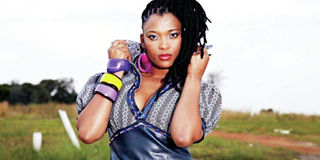Nkulee Dube following in her father’s footsteps

What you need to know:
- The day when reggae star was shot dead , he was with his daughter. 11 years after ,she is taking after him
Last week the World commemorated 11 years since reggae star Lucky Dube was shot dead , a moment that shook the music world.
On the day he was shot on October 18, 2007, his daughter Nkulee Dube was in the car and witnessed the gruesome murder. Several years later she still has difficulties talking about it.
Now an artist in her own right, she released her first album 2012 which she aptly titled ‘My Way’. Her impressive stage presence resembles that of Lucky, but Nkulee has managed to find her own soulful style. South African roots reggae, flavored with dancehall, spiced with jazz - she calls it ethno ragga.
Below are excerpts of her interview with UnitedReggae.com where she speaks about her growing up and the tours plus not being a Rastafarian.
Is it really a surprise that you are doing music?
I’ve always wanted to sing, but I have always been shy about my voice. So I think it took a lot of years for me to be comfortable and be confident with my voice on stage or in front of people. I think I’m comfortable and confident in front of people now.
Whom did you work with on that first album, My Way?
We recorded at Native Rhythms Studios, which is my recording company. I’m blessed to have had like the most amazing musicians on this album. I’ve worked with Silly Walks from (Hamburg), Germany. They gave me two tracks, two riddims to voice. I also have Joel Klein, who is like a scientist in guitar. He has also worked with a couple of people - Miriam Makeba, just to name the one person that people recognize. I also have Bethuel Mbonani on drums, who I play with right now in my band. He’s actually the producer of the album. I also have Thuthukani Cele from the One People Band, who was on the keys. And some other artists, beautiful voices from the Ladies that I’ve worked with before. I was just surrounded by great musicians.
Apart from reggae which sounds did you grow up listening to?
I grew up with jazz, a lot of jazz. My Mom loved jazz - the old from the fifties, you know. Actually they didn’t call it jazz then, they called it the blues. So that’s something that was always playing in the house. That’s the music I grew up with. I wake up and the songs come and I just write everything that I hear in my head down before I forget it
What was it that you liked so much about jazz music?
The way jazz musicians express themselves through notes and not saying anything. And you’ll be like “oh ya, ya, I feel that, I understand”. So they can just completely express themselves through music. Like only music, no vocals, which I respect, like release an album without saying anything and let the music speak for itself. That’s what I liked about jazz.
Do you see similarities between jazz and reggae music?
Yes there are (similarities), besides the music part. In reggae, just like (in) jazz, we express ourselves through music. Because everyone in the world can identify that that’s a reggae song.. If it plays like (that), that’s a jazz song. So you can recognize (that) immediately. With reggae and jazz, they have their own identity in terms of sound.
Which Jamaican reggae artists have influenced you?
I like Morgan Heritage. I think they have a bit of an influence, because I have crazy albums, crazy posters, I’m a fan and I think, Morgan Heritage does a lot. Especially like a stage presence and how they perform and how I would love to get to that level. So they do inspire me as an artiste.
Your mother must be very proud of you.
She is and she tells me that every day. Doesn’t matter what wrong I do, she’s like it doesn’t matter how bad it becomes. Maybe I feel very sad and I feel whatever, she always says “I’m still proud of you. You’ve done this, you’ve done that, you’ve achieved this and this and that. And how many people can you say have achieved that?” So, in her eyes, I’m an angel .
You only saw your father live on stage once or twice?
Actually once, and then the second time was when his record company had gathered their own artists together to show off. It was just a showcase. He was invited there and we went there as a family. The other one is not really a show. But a show-show was once.
What memories do you have of your father as a father?
He’s always been a strict dad. He was a very, very strict father, like he didn’t want things that didn’t really belong there, like fake hair, fake nails. You go and have your manicure and you get home and you’re like “ah, I have to take all of this off, all my money...” So he was very strict as a father.
A lot of Jamaican artists love to perform in South Africa. How has this supported SA music?
It has a lot of support in terms of music. But they have to understand it first. That’s why we have clubs that only play reggae, that only play dancehall. So it’s kind of a different scene for them. So they get there, and it is always packed. Every Thursday night, it is always packed. The more they get used to that - when they say, “that artist that we heard last week, remember at the club, he’s coming...”, then everybody wants to see you. That’s how South Africa works.
Do you see yourself one day perform in Jamaica?
I would love to, definitely. I would love to play in Jamaica. I know it can be but intimidating, you know, you’ll get there and you’re like “this is their sound”... It can be, but I would love to. I would love to meet Tanya (Stephens), I think that’s one reason you’d have to come to Jamaica. I’ve already met Sizzla, so I’d like to meet Tanya (laughs).
Did you have any links through Black Dillinger?
The first song, Give It To Me, that’s how I got the link through Dillinger. And then after that, they just talked to me straight. ‘Cause I didn’t know about them, and then they wanted to work with me.
and they didn’t know how to get hold of me. Dillinger was like “oh yeah, I know her” and that’s how we met. We’ve been working very nice together.




